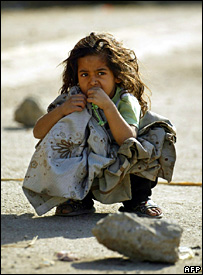Two million children in Iraq are facing threats including poor nutrition, lack of education, disease and violence, the UN children's agency, Unicef, has said.
Hundreds were killed in violence during 2007, while 1,350 were detained by the authorities, it said in a new report.
Some 25,000 children and their families had to leave their homes each month to seek shelter in other parts of Iraq.
But Unicef said the fall in violence in recent months was opening a window for more international assistance.
Earlier, the top US military commander in Iraq, Gen David Petraeus, told the BBC that the number of violent attacks in Iraq had fallen to its lowest in two-and-a-half years.
According to recent figures, some 536 Iraqis have died in violence so far this month, compared with more than 2,300 in December 2006.
'High price'
In a report entitled "Little Respite for Iraq's Children in 2007", Unicef said Iraqi children continued to pay too high a price for their country's turmoil, and that this year things had got worse.
The report said an average 25,000 children per month were being displaced from their homes as their families fled violence or intimidation. By the end of the year, 75,000 children had resorted to living in camps or temporary shelters.
The disruption led to extreme hardship for many children and eroded access to education and healthcare, Unicef said.
Many of the 220,000 displaced children of primary school age had their education affected in a country where around 760,000 children (17%) were already absent from primary school. Only 28% of 17-year-olds sat their final exams.
Unicef said children in remote and hard-to-reach areas were frequently cut off from healthcare and that only 20% outside the capital, Baghdad, had working sewerage in their community. Access to safe water was also a serious issue.
But the agency said there had been some progress during 2007 - more than 4m children were vaccinated against polio and 3m against measles, and more than 500,000 internal refugees were given medical help, safe water and shelter by relief agencies and local communities.
It also said the current fall in violence provided an opportunity to deliver more aid and to get a clearer view of exactly what the conflict had done to Iraq's children.
"Iraqi children are paying far too high a price," said Roger Wright, Unicef's special representative for Iraq.
"While we have been providing as much assistance as possible, a new window of opportunity is opening, which should enable us to reach the most vulnerable with expanded, consistent support. We must act now."
Mr Wright stressed that Iraqi children should be the priority for international investment in Iraq as they would be the "foundation for their country's recovery".
PHOTO CAPTION
An Iraqi girl couches in a street in central Baghdad (4 December 2007)


 Home
Home Discover Islam
Discover Islam Quran Recitations
Quran Recitations Lectures
Lectures
 Fatwa
Fatwa Articles
Articles Fiqh
Fiqh E-Books
E-Books Boys & Girls
Boys & Girls  Articles
Articles










